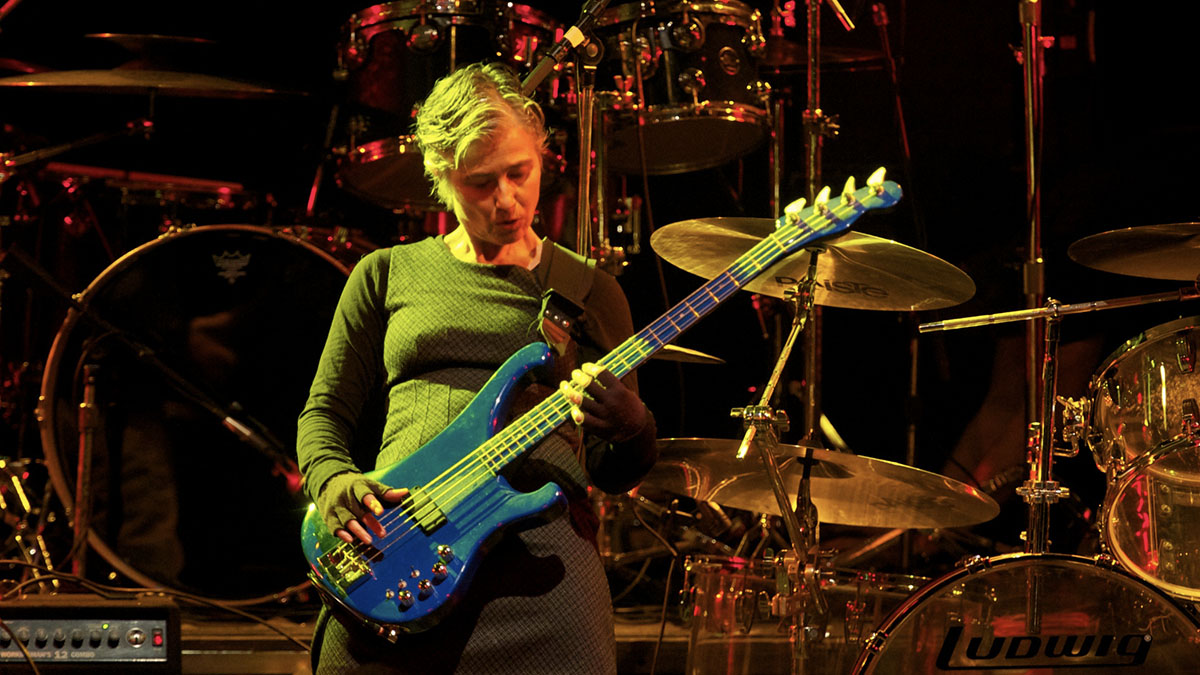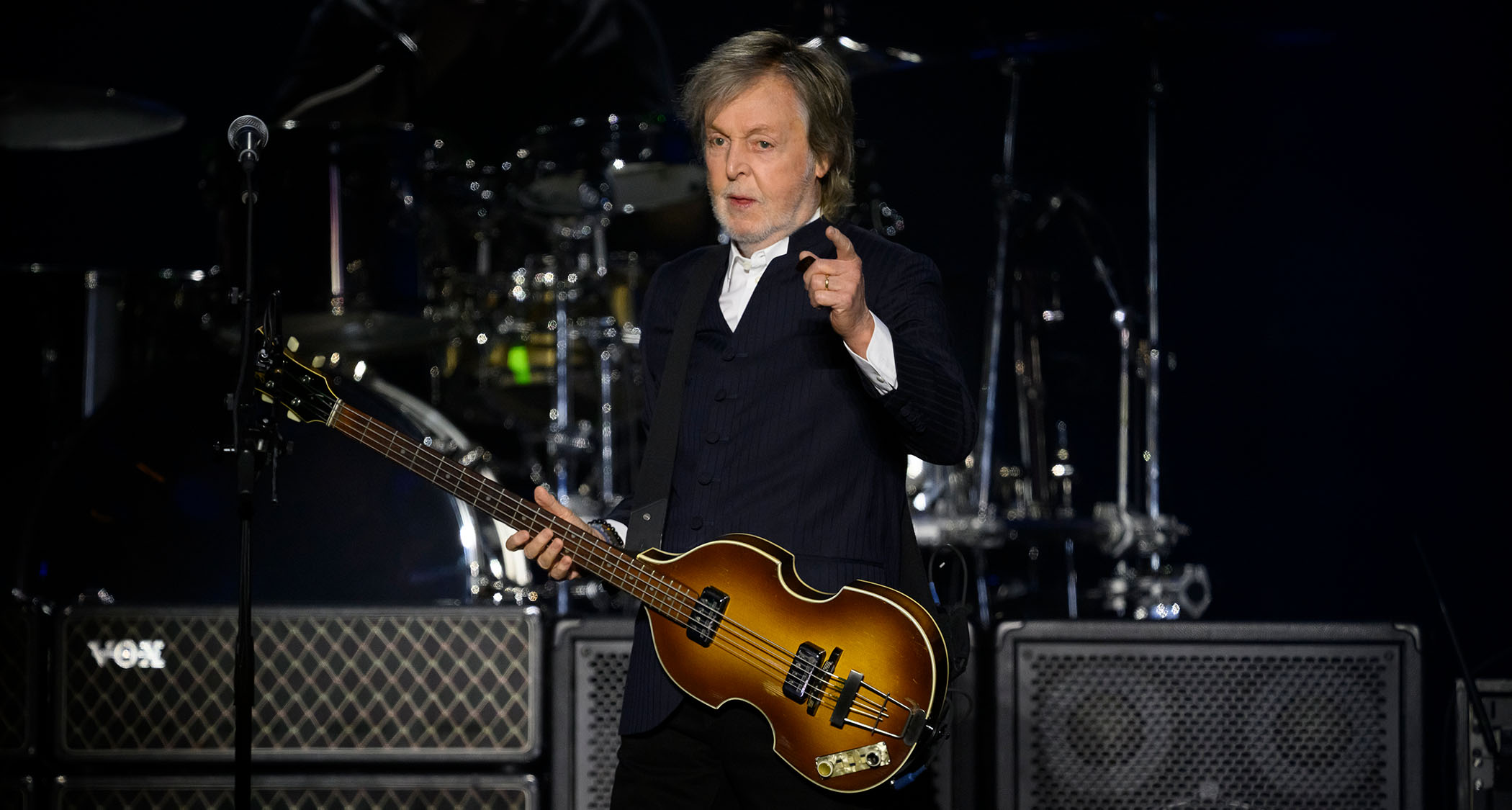Kira Roessler: “I don’t think I understood how physical an instrument the bass guitar is until I was in Black Flag”
As the former Black Flag bassist releases her first solo album, we find out how a hardcore punk rocker ends up working on Game of Thrones and bagging a shelf-load of Emmy awards

You’ll have heard of Black Flag, the hardcore punk band who formed in 1976 and are still going today, although there have been many breaks in their activity. Their most renowned lineup, and also their most prolific, consisted in the mid-'80s of Henry Rollins (vocals), Greg Ginn (guitar), Kira Roessler (bass), and Bill Stevenson (drums), who made an enduring cult impact with releases such as Family Man and Slip It In (both 1984).
Roessler parted ways with Black Flag in 1985 and formed a two-bass band, Dos, with her then-husband Mike Watt of the Minutemen. The duo continue to operate sporadically, but her main focus as a career these days is as a dialog and sound editor on a number of TV and film productions. Two of these have been rewarded with Emmy awards, and she was also part of the Oscar-winning team behind 2016’s Mad Max: Fury Road.
Between her film commitments, Roessler has found time to record a solo album, Kira, with her brother Paul as producer. It’s a dark, minimalist set of songs, focused on slick, droned bass parts, and sparse textures, and quite brilliant.
Tell us about your new album, Kira.
“I’ve been writing the songs for years, and my brother Paul at the Kitten Robot studio would polish them, but it was never my intention to release them out into the world. When Kitten Robot started a record label, he told me that they wanted to put out this solo record.
“For whatever reason, it felt right: I’m 60 this year, so it felt interesting to release my first solo record now, even though it’s been years and years in the making, and was never necessarily intended to be put on display and criticized.”
I love the unhurried vibes of the music.
All the latest guitar news, interviews, lessons, reviews, deals and more, direct to your inbox!
“I appreciate that, thank you. I think that’s part of what drives me – to express emotions by leaving spaces in the music. The tranquillity of it is the only way I know how to make myself feel it. I hope others can feel what I’m trying to express.
“The mood was probably very affected by the fact that I create this stuff alone in my room: It’s not collaborative in the sense of some rock band playing in a garage. It’s a very quiet, almost lonely exercise in expressing myself.”
Did you write the songs on bass?
“Yes. I’ve been playing bass longer than I’ve been a woman, you know, so it’s an extension of me, and I don’t feel limited by it at all. Generally, the process is that I have some sort of word or phrase or feeling that I want to write about, and then I pick up the bass and I use it to start to musically say what I’m trying to say, usually before there are words.”
What inspired you to record the songs?
“Right after I got kicked out of Black Flag in 1985, I was moving to New Haven, Connecticut to work at my first computer job. My brother’s kids were very young at the time, and I was afraid that they were going to forget me, so I started recording these bedtime stories, just with my voice and bass, because I thought that was a soothing combination.
At any given moment, I have 20 songs in some state of completion and process, whether it’s just an idea for a bassline to being somewhat complete
“I would try to interpret the story and capture its emotion in the basslines. These were some of my earliest explorations in recording just for the love of doing it. I went from Dr. Seuss songs when they were very young, all the way to Edgar Allan Poe as they got older.
“I tried to get more sophisticated as I went along, and my nephews probably stopped listening to them, but it was a writing challenge that I really enjoyed. Some of those songs became the new ones on the record. At any given moment, I have 20 songs in some state of completion and process, whether it’s just an idea for a bassline to being somewhat complete. As to whether anybody else hears it, that’s a whole separate exercise.”
Do you arrange the songs before you record them?
“No, I’m not someone who imagines whole songs in my head. What I generally do is sit down in front of Pro Tools with my bass and I start to record things. Sometimes it’s just a single part, because I’ve learned to make use of occasional free half-hours: I’ll write a piece of a song and then go away and come back to it and enhance it.
“This is partly why the album has taken so long, because I generally work a day job as well, so I have to make use of small chunks of time and build on things. Once there’s a bass part forming the structure of a song, then I’ll either work on a second bassline, or I’ll imagine some sort of melody and sing it. But this is very much bass music written and sung by a bass player, not a singer.”
Will you tour the new album?
“That’s a very interesting question, and one that I’ve been asked more often than I thought I would be. I can say that I will not be going on tour. That’s not really on the cards for me.
“I do miss playing live, even though I haven’t done it in some years, so the answer is that I’m trying to explore a way to create an event. It’s in its infancy, but I’m hoping to make it happen. It’s not going to be a traditional thing. It won’t be what people expect.”
So, no tour bus for you?
“No, I don’t miss that part. I miss playing for people, of course, but the thing about touring is that the live show is a very small part of each day.”
What was the gear you used on the record?
“I have a custom bass that I’ve played for the last 15 years. I got it after Mike Watt and I were on a little Canadian tour with our band Dos, and my pinky started failing. I was playing my Rickenbacker and my pinky finger was not co-operating by the third or fourth show in a row.
“Mike said to me, ‘Look, it’s time you went to a three quarter-scale bass.’ There’s a luthier named Mark Garza, who makes a custom Garz bass for Mike, and he made me a bass that looks like a Rickenbacker but with the headstock from a Telecaster. It is not like any other guitar: it’s electric blue, and it’s a beautiful bass. Unfortunately, it was stolen out of my house, along with some other stuff.”
That’s terrible.
“Yeah. I basically collapsed into a little puddle when that happened, but then I called Mark Garza and he made me another bass, a blonde one. Luckily, I had a very kind friend who contacted the head of security at Universal Studios on my behalf. He was a former cop, and he knew what to do, so he got a picture of my bass and sent it to guitar shops all over the place, thinking that someone might bring it in and try to sell it.
“Sure enough, 10 days after my bass was stolen, some guy showed up with it at a shop. Because it’s such an unusual bass, the guy at the shop recognized it, and said to the thief, ‘I have to take a picture of your driver’s licence’ – and the guy took off, leaving the bass! So I got it back, which I know is a rare story.”

How did you get into bass in the first place?
“My love for bass goes all the way back to my childhood. I started on piano when I was six, but I quit out of frustration from competing with my older brother and never being as good as him. He was really into Emerson, Lake & Palmer and Jethro Tull and bands like that, and he had written a 40-minute progressive rock opera.
“The bass player in his band quit, and suddenly a light went on for me, and I thought ‘I don’t have to compete with him – I can play a different instrument and join his band’. So I bought a bass from one of the guys in that band, and started practicing after school, every day, and at weekends. I was never good enough to join that progressive rock band, though, and I wasn’t that into prog anyway.
“I was listening to David Bowie and the Rolling Stones, so in hindsight, I’m surprised that I even wanted to join that band. Anyway, Paul got into punk rock, and that wasn’t quite as difficult, so I joined his punk rock band. Again, I was just the kid sister following along. I fell into it, really, just because there was a vacancy in a band.”
You played a Rickenbacker at first.
“The only reason I started playing on a Rickenbacker was because the guy in the band handed me one, but it turned out to be the right choice, because my hand isn’t particularly large, and I liked the neck being a little thinner than a Fender.
“I wasn’t particularly drawn to the sound of the Rickenbacker, so I started replacing the electronics and the bridge. Again, I just fell into playing that bass. My whole life has been like that. I fell into my career completely accidentally. I tend to jump into the opportunities that are thrown at me.”
Was the rebellion of punk rock attractive?
“Of course. My tendency was to be a tomboy and a nonconformist, never really feeling like I fit in. Punk rock felt right because it was a bunch of misfits: a bunch of people who just didn’t fit with society’s norms in terms of music and in terms of how we looked, so that was appealing, and it felt right to me.”
If you listen back to your work with Black Flag, how do the bass parts sound to you?
“I was not particularly creative. What they were asking me to do was hold down the basic structure of the songs, so that’s what I did. At the time, that was more of a physical challenge than a creative challenge for me. In terms of how the bass actually sounds, I think I captured a certain amount of power. That was an education for me, because I don’t think I understood how physical an instrument the bass guitar is until I was in Black Flag.
“Having that additional strength and power, and not being limited by my hands or my brain, was wonderful. It opened things up for me. I don’t necessarily put a Black Flag record on and listen to it, but if someone posts a live clip, I might click on the link, because I’m always curious if the sound is any good. Once in a while, there’s something that sounds kind of good, and I watch myself attacking the bass, and my neck starts hurting just looking at it.”

What were the challenges for you in Black Flag?
“Most of the time I was at my absolute physical limit, you know. The first week I was in the band, I did something to the tendon in my picking hand and went to the emergency room. They put me in a splint and said, ‘Don’t play for six weeks.’ I was like, ‘But I just joined a punk rock band!’, and four days later, I was playing again. During the first tour, you would have found me at the end of every gig with my hand in an ice bucket.”
Ouch. Did your hand get stronger?
“No, my right hand was always a bit of a limitation. I did dig a hole in my Rickenbacker, just from playing really hard with my middle finger on the E string – I think that’s kind of cool. But I never felt that my hand got stronger. I think the muscle structures there are what you’re stuck with; it’s not like other muscles that can grow.
“I was able to hold my end up, though – I was able to do it. They never seemed to feel that I was the weak link, and when they asked me to leave in 1985, I don’t think it had anything to do with my bass playing.”
So why did they ask you to leave?
“Bands are like marriages of several people, you know, and just like marriages, it’s amazing when a band stays together for any amount of time. You all have to be so in sync with what you’re trying to achieve, and where you are in your life, and often the personalities work for a while and then there’s a shift.
Dos too was a marriage, in more ways than one. It was often like a battle, but the cool thing about that is that the battle comes across musically as something that works
“People change and grow, or you’re on tour and exhausted, and you express one too many complaints about your discomfort. They just didn’t want to play with me any more, but I don’t think it was my playing that did it.”
Presumably Dos was a more enjoyable exercise.
“Dos too was a marriage, in more ways than one. It was often like a battle, but the cool thing about that is that the battle comes across musically as something that works.
“It’s funny, when people ask about my influences, to me it’s usually about who’s challenging me, so when Mike and I created this two-bass band Dos, we were in the same frequency range, which was therefore somewhat of a battle for space. The songwriting was really about how to intertwine these two instruments and find the spaces and the holes in the music.”
How did you and Mike approach that?
“We felt very strongly that there wasn’t going to be a melody and a bassline, you know, with one of us at the bottom and one of us at the top. It was never going to be like that, so that challenged me to write first and second basslines for a given Dos song.
I admire a bass player when they’re doing what’s right for the music. Paul McCartney was right for his music. Dusty Hill was perfect for his music
“I learned a lot about how to try and enhance a song without stepping on Mike, who is a very expressive bass player. Because of what we were doing with bass, even when our marriage stopped working I always felt like the music gave us a structure to continue having a kind of relationship when we couldn’t live together any more. A lot of that was driven by our love for the bass guitar, truly.”
Which bass players influenced you?
“I admire a bass player when they’re doing what’s right for the music. Paul McCartney was right for his music. Dusty Hill was perfect for his music, you know. I’m not impressed by someone who’s more interested in showing me their skill than in doing what works for the music: I don’t need to hear how many notes you can play. On my record, I think the holes and the spaces in the music are as expressive as the notes.”
You also have a project with Devin Hoff.
“I do. Devin is a double bass player and he plays some bass guitar as well. We have a little project that we call Awkward, and have an EP on Bandcamp. We send music back and forth.”
What does your day usually look like?
“I get up, I walk and feed the dogs, and then I work. It depends whether I’m working at home or at a studio. I work from project to project, so there are sometimes spaces in between where I can do a little more music. I can’t do that if I’m in the midst of a project where my time is being sucked into a movie or a show.”
What is your job title?
“Generally speaking, I’m a sound editor, but sometimes I’m a dialogue editor or supervisor. The roles change depending on the project. I also work in ADR, which is automatic dialogue replacement when there’s something in a dialogue that isn’t working.
“Loosely speaking, the task is to make people’s mouths move and have the right sounds come out, as well as solving the problems of the sound that they record on the set, and trying to solve as many of those problems as you can before the mix is done.”
Is it hard work?
“If I’m on a project, it’s a 10-hour day, minimum. We’re basically on a 50-hour week by union arrangement, and then there’s overtime and weekends too, at different times during the project. That’s part of why I have to make my free half-hours count. When I work on music, it’s usually before work. I’m an early morning person, so I can record stuff early in the morning and send stuff to someone else.”
What do you do in your downtime?
“I’m very into taking care of myself and exercising, so I like to power-walk most days, or I’ll do some laps at a local pool. I’m a homebody, though. I don’t go to see gigs very much – it has to be something that I really want to see.
“It’s a big deal to get me out to a club to hear music, and some of that is because I’m very protective of my ears. I rely on them for work and for my joy of music. My husband is retired and is very busy playing golf most days. Things are generally pretty quiet around here.”
I’m a huge fan of Bass Player magazine. Bass is my life
Tell me you’ve got your Emmys proudly on display somewhere?
“I have my two Emmys in the front hallway on a little shelf. They are somewhat on display. What’s cool about the Emmys is that they have these wings, or prongs, that would make an excellent potential weapon if someone were to come in my front door that I didn’t want to have come in.”
That’s a very punk-rock way of looking at it. Thank you for the interview, Kira.
“It’s been a pleasure. I really appreciate getting to do this. Of course I’m a huge fan of Bass Player magazine. Bass is my life, so doing this is a big honor.”
- Kira is out now via Kitten Robot.
Joel McIver was the Editor of Bass Player magazine from 2018 to 2022, having spent six years before that editing Bass Guitar magazine. A journalist with 25 years' experience in the music field, he's also the author of 35 books, a couple of bestsellers among them. He regularly appears on podcasts, radio and TV.

